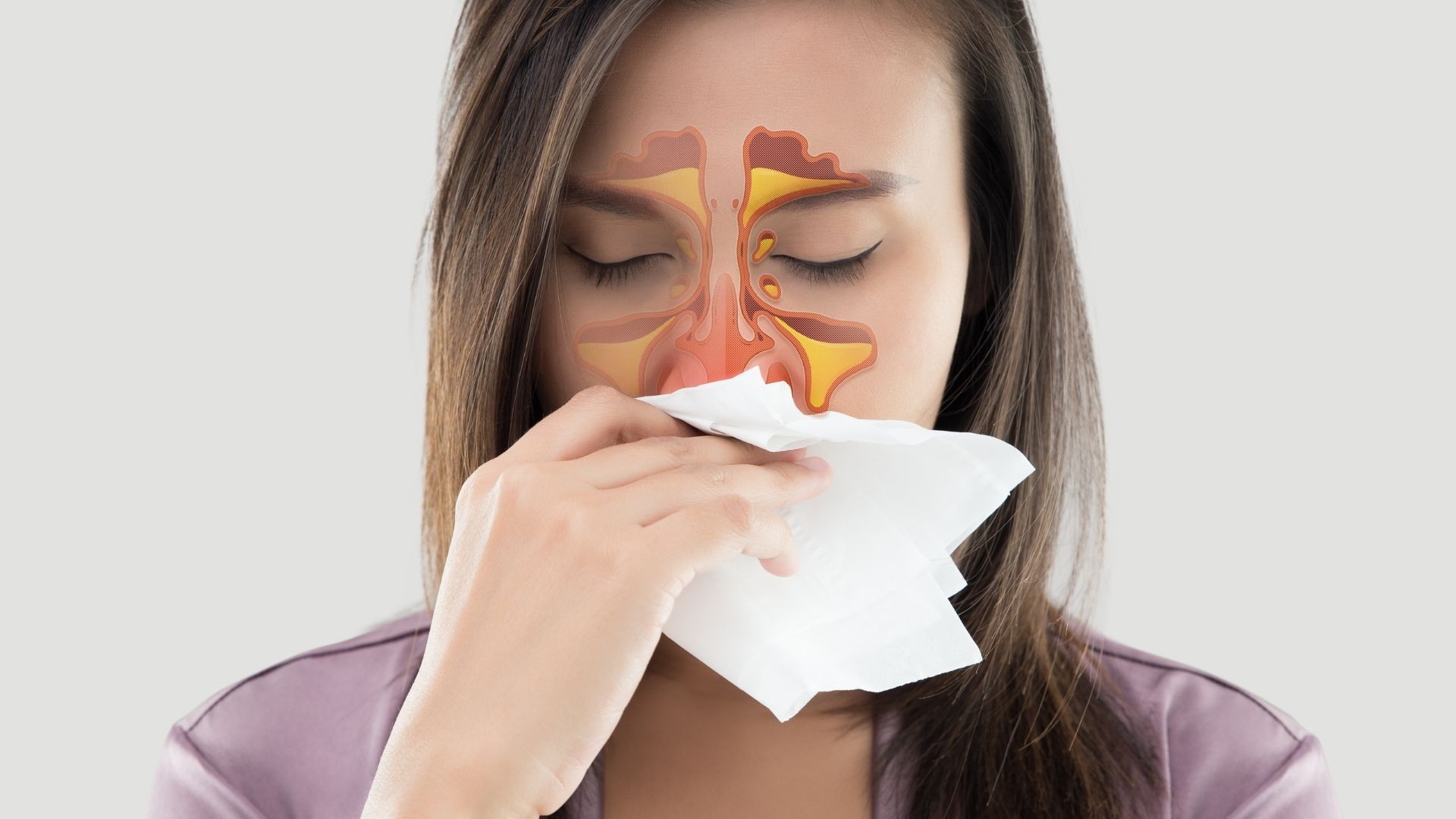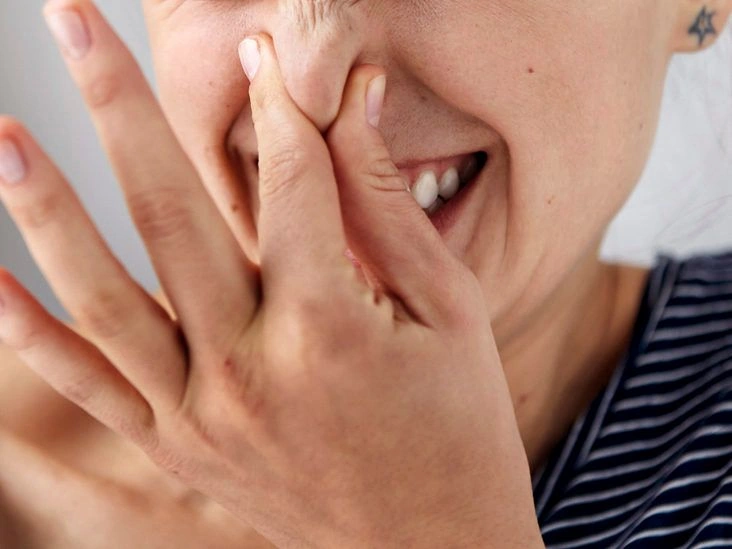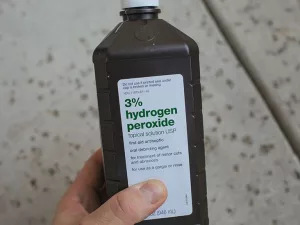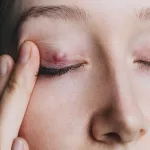Several conditions can produce an unpleasant odor in your nose, including nasal polyps, sinus infections, and postnasal drip. A medical professional can identify the cause and suggest the appropriate treatment.
Almost daily, you encounter offensive odors in your environment. But what about an offensive scent coming from your own nose?
Multiple health issues might cause a rotten or foul smell inside the nasal passages. The good news is that most of these odors are temporary and not indicative of an immediate life-threatening problem.
Still, you may need a clinician to examine your sinuses and throat to determine the right treatment.
Keep reading to find out more about possible reasons for a bad smell in the nose.

Nasal polyps
Nasal polyps are soft, benign growths that resemble teardrops. They can develop on the lining of your nasal cavity or sinuses as a result of long-term inflammation.
Occasionally, you might notice a rotten smell in your nose. This can happen when fluid accumulates inside the polyps, originating from the damp mucous membrane lining.
Other, more typical symptoms of nasal polyps may include:
- reduced sense of smell and taste
- runny nose
- nasal congestion
- headache
- pressure in the forehead and face
- snoring
Nasal polyps are often tiny, so you might not be aware they’re present. However, larger polyps can form or many small ones can occur, which may obstruct nasal passages.
Treatment may involve intranasal corticosteroid sprays or drops, such as fluticasone (Flonase) or mometasone (Nasonex).
If those medications don’t help, a physician might prescribe oral corticosteroids like prednisone for a short course. In more severe situations, endoscopic surgery could be needed.
Addressing the underlying triggers—such as allergies, infections, or asthma—is also important to manage polyps.
Sinus infection
Sinus infections, or sinusitis, can be caused by viruses, bacteria, or fungi.
Symptoms of sinusitis may include:
- yellow or green nasal discharge
- blocked nose
- swelling, pain, and tenderness around the cheeks, forehead, and eyes
- headache
- fever
- tooth pain
- loss of smell
- bad breath
Sometimes a rotten smell in the nose is present, usually resulting from mucus accumulation in the nasal cavities.
Treatment varies based on the type and severity of the infection.
Acute sinusitis might be managed with over-the-counter nasal sprays, home remedies, and occasionally antibiotics. Chronic sinusitis may require prescription steroids or antihistamines.
In certain cases, sinus surgery may be necessary.
Postnasal drip
Foul-smelling mucus in the nose, especially when it thickens and continually drips down the back of the throat, is indicative of postnasal drip.
Normally, mucus helps to:
- keep your nasal linings healthy
- respond to infections
- moisten the air you breathe
- prevent foreign particles from entering your airways
Mucus mixes with saliva and is typically swallowed unconsciously.
However, a cold, the flu, allergies, or a sinus infection can cause mucus to thicken, making normal drainage more difficult.
Postnasal drip may start with mild signs like coughing, sore throat, and frequent swallowing. Occasionally, you may notice a foul-smelling discharge coming from one nostril.
Consult a clinician if postnasal drip persists beyond 3 weeks or if your malodorous mucus is yellow, green, or grey.
Treatment for postnasal drip may include a combination of:
- drinking plenty of fluids
- sleeping with your head elevated
- inhaling steam
- using decongestants
- saline nasal sprays
- using a humidifier to add moisture to your nasal passages
If these measures are ineffective, a doctor may suggest other treatments based on the root cause, such as:
- antihistamines for allergies
- steroid nasal sprays to reduce inflammation
- antibiotics for bacterial infections
Tooth decay
Tooth decay occurs when bacteria accumulate on a tooth and erode its surface. This bacterial buildup can cause persistent bad breath and an odor that seems to come through the nose.
Maintaining good oral care—brushing and flossing daily—is the best prevention for cavities and gum disease.
If a dentist finds a cavity or other dental issue like periodontitis, seek treatment promptly.
Tonsil stones
Tonsils have pits and folds that can trap:
- saliva
- mucus
- food particles
- dead cells
Debris can sometimes harden into small formations known as tonsil stones. Bacteria can feed on these stones, occasionally producing an unpleasant smell in your mouth and nose.
Poor oral hygiene and large tonsils raise the likelihood of stones, though many people develop them despite good dental care.
Treatment options for tonsil stones include:
- gargling with salt water
- irrigating the tonsils with a water flosser
- tonsillectomy
Phantosmia
Phantosmia is an olfactory hallucination—smelling odors that aren’t present, often perceived as originating in your nose or nearby.
Phantosmia can appear after a respiratory infection or head trauma. Conditions such as Parkinson’s disease, brain tumors, or inflamed sinuses may also cause phantom smells.
For some people, phantosmia goes away on its own. For others, treating the underlying condition may eliminate the false smell sensations.
Chronic kidney disease
Chronic kidney disease (CKD) involves progressive loss of kidney function.
Your kidneys filter waste from the blood for excretion in urine. When kidney function declines, waste products can accumulate in the body.
These wastes may produce an odor you notice on your breath and in the taste in your mouth. Consequently, you might sense an ammonia-like smell at the back of your nose.
This odor typically appears only after CKD reaches advanced stages (stage 4 or 5).
By then, you’ll likely experience other signs such as kidney-related pain, changes in urine color, and persistent tiredness. A new ammonia smell is unlikely to be the earliest indicator of kidney disease.
COVID-19-related parosmia
Loss of smell is a known symptom of COVID-19.
However, some research suggests that people may also experience distorted smell perception, called parosmia.
Parosmia can make foods smell unpleasant or cause someone to detect cigarette smoke in a smoke-free environment.
This distortion can worsen over time and have significant health effects—for instance, if food smells rotten, a person may eat far less.
COVID-19-related parosmia may develop weeks to months after the initial infection. It may result from changes that occur as damaged olfactory receptors regenerate after a loss of smell.
There is no single cure for COVID-19-related parosmia, but clinicians may recommend olfactory training therapy.
When to see a doctor
See a medical professional if:
- a bad smell in your nose persists for more than one week
- you frequently notice a foul odor from your nose
- you have other symptoms such as facial swelling, nasal blockage, vision changes, or persistent headache
If you don’t have a primary care provider, tools like Healthline FindCare can help you locate physicians in your area.
Frequently asked questions
How do I get rid of the rotten smell in my nose?
Treatment depends on the cause and accompanying symptoms. Management may include home remedies like steam inhalation, over-the-counter nasal sprays, prescription medications, or, rarely, surgery.
Why do I smell something dead in my nose?
A foul smell in your nose can stem from several issues, such as sinusitis, nasal polyps, or dental decay. Consult a healthcare provider for an accurate diagnosis and treatment plan.
Can a sinus infection smell like poop?
Sinus infections can cause mucus build-up that becomes a breeding ground for bacteria. Without treatment, this can produce a foul odor that some people describe as resembling feces.
What does a nose infection smell like?
A nasal infection may not always produce noticeable smells because it can block your nose and reduce your sense of smell. However, accumulated mucus can create an unpleasant odor.
Takeaway
An unpleasant odor inside your nose can have multiple causes. Most often, these issues respond to home care and over-the-counter treatments.
If you’re prone to recurrent sinus infections, you may experience these unpleasant episodes repeatedly.
Talk with a doctor about ways to reduce your risk of future nasal and throat problems.

























Leave a Reply
You must be logged in to post a comment.